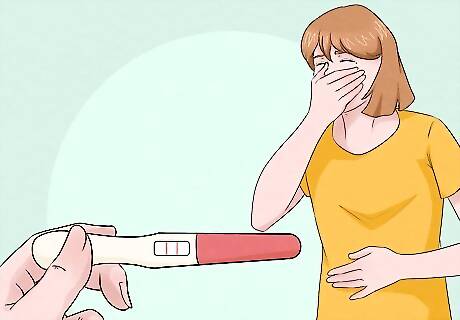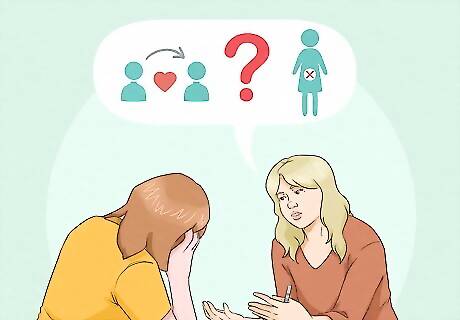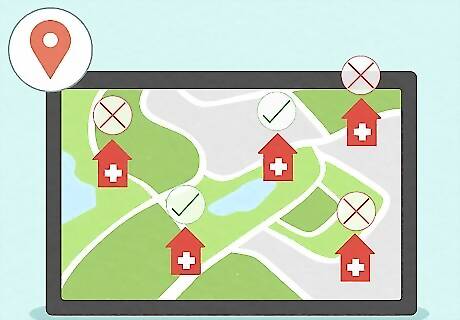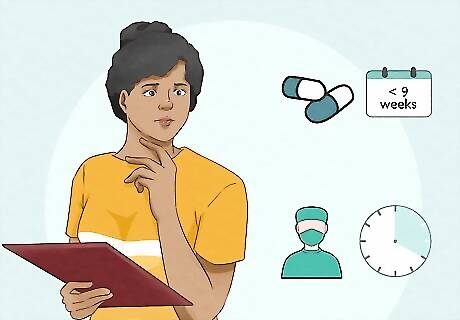
views
Considering Your Options

Confirm your pregnancy. Missing a period is a common symptom of pregnancy, but it does not mean it is a certainty. If you are late, you might suspect that you are pregnant, particularly if you have other common symptoms such as nausea or tenderness in your breasts. If you think you are pregnant, it is a good idea to take an at-home pregnancy test. Many of these tests are considered to be very accurate, and are widely available at drug stores. If you are a student, your school nurse might be able to provide you with a pregnancy test. If your at home test indicates that you are pregnant, you will want to get that diagnosis confirmed by a doctor. At home tests are pretty reliable, but the laboratory tests done in your doctor's office are the best way to confirm a pregnancy. Make an appointment to go in as soon as possible.

Determine whether it's safe to tell anyone what's going on. If your family or community is extremely conservative, then it may not be safe to tell them that you're pregnant, especially if you think you will abort. Don't risk being verbally abused, physically abused, or kicked out of your house if you think it's possible. If it's not safe to tell your family, you may be able to go out "camping" or "on a road trip" and get an abortion in secret. (See if there's a trusted friend who will go with you and corroborate your story.) Be cautious about signing forms and make it clear to the clinic that you want this to be secret from your family and your family doctor. After your abortion, you might not feel well. Your family might think it is a cold or the flu.

Consult a doctor, if it's safe to do so. Once your doctor has confirmed your pregnancy, you will likely have many questions. Your doctor is a great resource for you. Being pregnant will cause significant physical changes to your body. Even if you don't plan to be pregnant for long, you should ask your doctor what you can expect. Your doctor will also perform a physical exam, and may perform blood tests or an ultrasound at the visit. Ask your doctor to give you an approximation of how far along you are in your pregnancy. Many states have laws about when you can and cannot receive abortions. Typically, abortions are safest in the first trimester.

Think about your options. Being unexpectedly pregnant can be a very frightening experience. You might feel confused and scared. Give yourself a few days to think about your options. If you have a friend or family member you can trust, don't be afraid to ask for advice. Most importantly, think about the decision that is best for you and your health. Essentially, you have three options to choose from: parenthood, adoption, or abortion. Even if you know what you want to do, it is still a good idea to talk to a counselor. They can prepare you with what to expect. Reproductive health clinics also provide resources to people who aren't sure whether they want abortions, and can offer resources if you think you want to keep the pregnancy but lack money or support. If you can, you may want to talk to the potential father to help you make your decision. But, legally the choice is yours.
Having the Procedure

Locate the appropriate health care provider. Once you have decided to have an abortion, you want to make sure that you have the procedure in a clean, safe, professional medical office. It is possible that your gynecologist performs the procedure. If your doctor does not perform abortions, ask for a referral to an office where you can have the procedure. In the US, you can look for a Planned Parenthood. Planned Parenthood offers a comprehensive range of reproductive health care services, and can be a great resource for you (even if you decide to keep the pregnancy). Make sure to find out if the clinic you phone actually offers abortions. Some Planned Parenthood locations do. Many "crisis pregnancy" centers serve to try to scare and manipulate you out of getting an abortion. A simple question when you phone will get you the answers you need. There are two types of abortions. One is an in office surgical procedure and the other occurs by taking a prescribed pill. Once you have found a provider, discuss these two options with them. Ask the health care providers about abortion laws in your state. Some states require minors to have the permission of a parent or guardian before having an abortion. However, you can sometimes get permission from a judge to waive that requirement. Ask the clinic about the restrictions in your state.

Talk to your parents. If you are under 18, it is possible that you might need a parent's permission to have an abortion, depending on in which state you live. You can find this information out by asking your health care provider about the laws in your particular state. Either way, you might want to consider discussing your situation with your parents. Hopefully, they serve as a resource for you. Find the right time and place to talk to your parents. You want somewhere private, where you will not be interrupted. Ask your parents if this is a good time to talk — you don't want them to be distracted. Try to remain calm and honest. Articulate your feelings and your needs clearly.

Schedule the procedure without parental consent. Many states require parental consent, but there are also ways that you can still receive a legal abortion without that consent. If your parents will not agree to grant permission, or you are unable or afraid to talk to them about it, you will need to get judicial bypass. This is where a judge grants permission instead of the parents. Planned Parenthood has information on judicial bypass and can help you with the process. You can also call the National Abortion Federation Hotline, and they can help you understand the steps you need to take in your particular state. If you have ever been married, have a child, or have a medical emergency, the parental consent requirement does not apply to you.

Find a supportive person. If you feel like you are unable to talk to your parents, it's a good idea to find someone else you trust to talk to. Even if you are confident that you want to have an abortion, it can still be a very emotional experience. It can be very helpful to have a support system during this challenging time. Be calm and rational when having the conversation, and let them know you could use their help. Try to think of a family member or friend that you trust. Ask this person to go with you to get the abortion. You might need a helping hand — you are not allowed to drive yourself home if you've been sedated — or the comfort of a friend to help with the emotional experience.

Prepare for your visit. When you are scheduling your appointment, make sure to ask how much the procedure will cost. Typically, the abortion pill costs approximately $800. The surgical procedure can be as much as $1500 for a first trimester abortion. It's best to be prepared and know how you are going to afford the cost. This can ease the stress you feel on the day of the procedure. Many health care providers offer sliding-scale fees. This means that your income and ability to pay are taken into account. Often, this results in a greatly reduced fee. You can ask the doctor if there is the possibility of using a payment plan if you cannot afford the abortion outright. Try to schedule the abortion on a day where you do not have to go to school or work. Plan to give yourself at least the rest of the day to rest and heal.

Know what to expect. Before you arrive at the clinic, make sure that you know whether you will be receiving the abortion pill or if you will be having a surgical procedure. The pill is typically an option if you are less than nine weeks pregnant. It is effective 97 out of 100 times. If you are scheduled for a surgical procedure, it can be helpful to know what to expect. There are two common types of surgical abortions: aspiration and D&E (dilation and evacuation). Ask your doctor which you will be receiving. Before either procedure, you may be given medication to help you to relax. Before an aspiration, your doctor will examine and then numb your cervix. A suction device will be used to withdraw the fetus. This procedure takes about five to 10 minutes. But know that you will need time before and after the procedure to fill out paperwork and talk to the doctor. A D&E also begins with the doctor examining your uterus and numbing your cervix. Medication or fluids will be used to stretch your cervix. The doctor will then use a gentle suction machine to empty your uterus. This procedure will take about 20 minutes, with extra time needed to prepare your uterus.
Coping With the Effects

Understand the physical recovery process. After undergoing a surgical abortion, make sure to follow your doctor's guidelines for recovery. You may bleed or feel cramping in your uterus for up to a week after the procedure. Your doctor might provide pain medication to help you deal with the physical effects. You will also be prescribed antibiotics to help prevent infections. If you bleed excessively or the cramps become extremely painful, contact your doctor. You should also call the doctor if you begin to run a fever in the days following the abortion or have a vaginal discharge that is very thick or has a strong odor.

Acknowledge your emotions. It is normal to feel a range of emotions after your abortion. Some people mostly feel relieved. Others have more complicated emotions. For example, you might feel sadness, grief, or confusion. Whatever your emotions may be, give yourself time and space to feel them. Abortion is a very personal experience. Don't be ashamed if you are very emotional afterwards. Instead, acknowledge and accept the way you are feeling.

Ask for help. While it is normal to be emotional after an abortion, you do want to make sure you are on the road to emotional recovery. As a teenager, this is especially important, as you are already experiencing a lot of changes in your life. If you feel prolonged feelings of depression, guilt, or anger, it might be time to seek help. Sometimes you might feel better if you talk to a trusted friend or family member. Other times, your problem might be more severe. In that case, ask your doctor if she can refer you to a counselor or a support group. Remember, you are not alone.



















Comments
0 comment